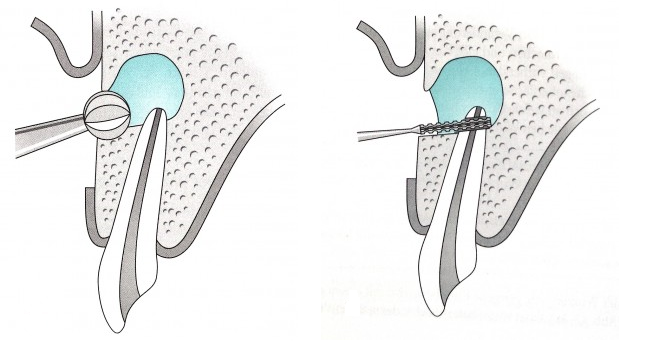Oral surgery is a speciality of dental medicine, and the most common oral surgical procedures are complicated tooth extraction, impacted wisdom teeth, tooth root resection and extraction of residual roots and broken teeth. Oral surgery includes the reconstruction of the aesthetic and functional disorders of the oral cavity with pre-prostodontic and pre-implantologic procedures.In collaboration with other dental specialties of medicine, especially during orthodontic treatment it is sometimes necessary to remove some healthy teeth, for therapy to be successful and complete.All oral surgical procedures are performed under local anesthesia and they are completely painless!

Wisdom tooth surgery is the most common procedure in oral surgery. During the eruption of wisdom teeth can cause inflammation and painful symptoms called pericoronitis - inflammation of the surrounding gums (gingiva).
Wisdom teeth may be impacted or retained. Impacted wisdom tooth did not managed to fully erupt because the neighboring tooht represents a physical obstacles in the way of emergence. Most often there is another tooth that prevents the path of eruption. Retained wisdom tooth did not grown for some other reason, usually wrong way of growth, deep position of tooth's embryo, damage to the embryo, etc. Removing wisdom teeth is performed under local anesthesia, and surgery is performed by oral surgery specialist. The operation of extracting the wisdom teeth is pain-free operation.After wisdom tooth surgery , it is important that the patient comply with the instructions given to him and that the wound is kept clean because it reduces the risk of infection. Mild postoperative pain and swelling are normal after surgery. The feeling of numbness of the lower lip and tongue (paresthesia) can occur and are common clinical findings after extensive surgery with impacted wisdom teeth. It is important that patients do not get scared of temporary numbness of lips or tongue because it wears of after a short time.Recovering from the extraction of wisdom teeth is very individual and depends on a number of factors such as general medical condition, the extent of the procedure, the body constitution of the patient and whether the patien complies to the given instructions about the care and hygiene after surgery. Recovery from surgery varies from 1-2 days up to 7 days.

When endodontic root treatment and rehabilitation of chronic granuloma failed, surgery is indicated and it is recommended the removal of the root tip with a granulomatous process. In the case of a cyst in the root tip the procedure is identical. Filling the root canal is usually done through the crown of the tooth immediately before surgery.

By keeping the teeth and wound making the bone volume decreases, bone resurfacing results in aesthetic and functional defects. By augmentation it is possible to restore the lost bone volume necessary for implant-prosthetic rehabilitation in patients who want pleasant and functional dentures or purely for aesthetic reasons.